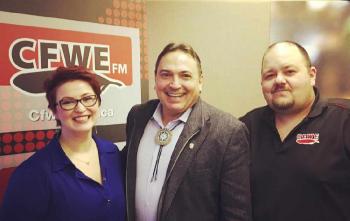Image Caption
Summary
Audio
By Shari Narine
With audio from Candice Ryan and Jeremy Harpe of CFWE-FM
Windspeaker Contributors
EDMONTON
Assembly of First Nations National Chief Perry Bellegarde say “unprecedented access” to the prime minister and federal Cabinet ministers has allowed his advocacy organization to achieve change for First Nations people.
Bellegarde points to the announcement that came Wednesday Jan. 10 from Public Safety Minister Ralph Goodale that Canada will be investing close to $300 million over five years to support the First Nations Policing Program.
The need for that funding was one of the top priorities set out in a memorandum of understanding that was signed between the AFN and the federal government.
“That’s an example of how the MOU is bearing fruit,” said Bellegarde. “We’re bringing about change…. We want these resources to have impact on the ground.”
He said commitments made by Prime Minister Justin Trudeau at two Special Chiefs assemblies have also resulted in action.
Among those commitments was legislation to revitalize Indigenous languages. AFN, along with the Métis National Council and Inuit Tapiriit Kanatami, are working with Heritage Minister Melanie Joly to develop legislation.
Bellegarde said he would like to see that legislation delivered in the next seven or eight months so it will be in place prior to the October 2019 federal election.
“(The Indigenous Languages Revitalization Act will be) law. So therefore it’s better to move toward that place because then it’s statutory and the funding is needed there and it will be ongoing,” he said. “Our languages should no longer be in the shadow.”
Bellegarde said he also wants to see NDP MP Romeo Saganash’s private members bill C-262, which ensures that the laws of Canada are in harmony with the United Nations Declaration on the Rights of Indigenous Peoples, passed before the next federal election. The bill, he said, is “a legal roadmap to reconciliation when it’s adopted and enforced.”
There are other issues that are important to First Nations people, Bellegarde said, but not everything can be achieved before the next election.
One of those issues is First Nations “getting out from under the Indian Act.”
There are 634 “Indian Act First Nations,” as Bellegarde refers to them, and many are still controlled by the Indian Act.
Reconfiguration of the country’s First Nations is necessary for the nation-to-nation relationship that is being sought.
Bellegarde said those talks of reconfiguration – whether by language group (there are 58 First Nation languages), treaty area, or other criteria – need to be led by chief and councils. AFN’s role, he says, is to facilitate those dialogues by ensuring proper policies and legislation are in place which respect treaty and inherent rights.
“People are at various stages across Canada in that development, in that dialogue (for reconfiguration). It’s all about moving beyond the Indian Act and creating our own laws, First Nation jurisdiction and that’s where things rest. It’s such a diverse country that everybody’s at different levels so we have to be respectful … and one size won’t fit all,” he said.
Decreasing the number of First Nations doesn’t necessarily mean a loss of autonomy for the smaller bands, Bellegarde notes as that will depend on the fiscal framework negotiated.
“We have collective rights,” he added.
The existing policies that the federal government has in place—comprehensive policy, specific claims policy, additions to reserve policy, inherent right to self-government policy—are all outdated and are based on extermination of rights and title, said Bellegarde, and not the recognition of rights and title.
Another issue is how the National Inquiry into Murdered and Missing Indigenous Women and Girls will be moving forward.
At the Special Chiefs Assembly in December, a resolution calling for an overhaul of the inquiry, including the removal of Marion Buller as chief commissioner and a two-year extension to the inquiry’s mandate, was passed. But less than 10 per cent of the chiefs voted.
“The resolution is clear so we support that in changing direction,” said Bellegarde. However, he added, “What it speaks to is we have to fix our AFN in the sense of how we make decisions as an organization.”
Revamping of the AFN’s charter, which hasn’t been changed in 20 years, will be one of Bellegarde’s priorities, should he be re-elected. Bellegarde says he will be seeking a second term.
“The charter is how we are guided. Trying to find ways to make AFN more relevant to First Nations people, we want to make it more responsive to the issues and needs that have been identified, and make it respectful to the diversity across Canada,” he said. Almost half of First Nations people live off-reserve.
He adds that much has been accomplished over his tenure and he would like to continue to build the relationships he has carefully cultivated with government leaders. The election of a new national chief would result in lost time and lost momentum.
“You’d have a complete change. You’d have to start rebuilding relationships again with the federal and provincial governments,” he said. “But again it’s up to the chiefs of Canada who’ll make that determination and decision in July."
Bellegarde was elected in 2014 with 63 per cent of the vote in the first ballot.

